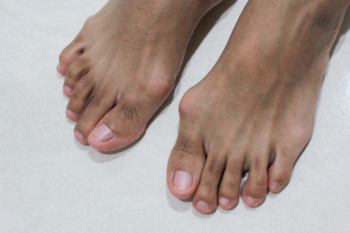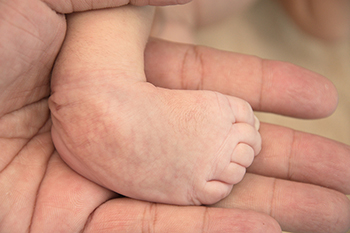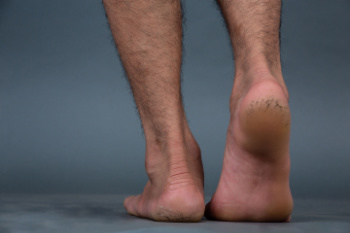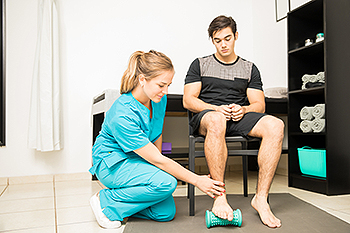
Heel pain in children often stems from conditions like Sever’s disease, Achilles tendinitis, or plantar fasciitis. Sever’s disease, which typically affects active children aged eight to 14, results from repetitive stress on the growth plate of the heel during activities like running or jumping. Symptoms include pain at the back of the heel and difficulty walking. Achilles tendinitis occurs when the tendon that connects the calf muscles to the heel becomes inflamed, often due to a sudden increase in activity or repetitive motions like jumping or running. Symptoms include pain, swelling, and stiffness in the back of the foot. Plantar fasciitis, though less common among children, involves irritation of the thick tissue along the bottom of the foot. It may be due to overuse or poor footwear support. A podiatrist can evaluate the cause of your child’s heel pain, provide a diagnosis, and offer effective treatment options. If your child complains of heel pain, it is suggested that you schedule an appointment with a podiatrist.
Many people suffer from bouts of heel pain. For more information, contact Brent Harwood, DPM of Southeast Podiatry. Our doctor can provide the care you need to keep you pain-free and on your feet.
Causes of Heel Pain
Heel pain is often associated with plantar fasciitis. The plantar fascia is a band of tissues that extends along the bottom of the foot. A rip or tear in this ligament can cause inflammation of the tissue.
Achilles tendonitis is another cause of heel pain. Inflammation of the Achilles tendon will cause pain from fractures and muscle tearing. Lack of flexibility is also another symptom.
Heel spurs are another cause of pain. When the tissues of the plantar fascia undergo a great deal of stress, it can lead to ligament separation from the heel bone, causing heel spurs.
Why Might Heel Pain Occur?
Treatments
Heel pain should be treated as soon as possible for immediate results. Keeping your feet in a stress-free environment will help. If you suffer from Achilles tendonitis or plantar fasciitis, applying ice will reduce the swelling. Stretching before an exercise like running will help the muscles. Using all these tips will help make heel pain a condition of the past.
If you have any questions please contact one of our offices located in Fairhope, Brewton, and Atmore, AL . We offer the newest diagnostic and treatment technologies for all your foot and ankle needs.

Bunions, medically referred to as hallux valgus, occur when the joint at the base of the big toe begins to protrude, often causing discomfort or difficulty in wearing shoes. A bunion develops as the tip of the big toe leans toward the other toes, leading to a wider foot structure. Symptoms of bunions include pain in the affected joint, swelling, redness, or numbness in the toes. In severe cases, bunions may limit mobility or contribute to other deformities like hammertoes. Risk factors include genetic predisposition, rheumatoid arthritis, or structural issues like flat feet. Wearing improper footwear, such as high heels or narrow shoes, can worsen the problem. A podiatrist can diagnose and manage bunions by evaluating the foot's alignment and identifying the severity of the condition. This foot doctor may recommend custom orthotics, adjustments to footwear, or, in persistent cases, surgery to correct the deformity and alleviate symptoms. If you have problems with bunions, it is suggested that you schedule an appointment with a podiatrist for a diagnosis and treatment options.
If you are suffering from bunions, contact Brent Harwood, DPM of Southeast Podiatry. Our doctor can provide the care you need to keep you pain-free and on your feet.
What Is a Bunion?
A bunion is formed of swollen tissue or an enlargement of boney growth, usually located at the base joint of the toe that connects to the foot. The swelling occurs due to the bones in the big toe shifting inward, which impacts the other toes of the foot. This causes the area around the base of the big toe to become inflamed and painful.
Why Do Bunions Form?
Genetics – Susceptibility to bunions are often hereditary
Stress on the feet – Poorly fitted and uncomfortable footwear that places stress on feet, such as heels, can worsen existing bunions
How Are Bunions Diagnosed?
Doctors often perform two tests – blood tests and x-rays – when trying to diagnose bunions, especially in the early stages of development. Blood tests help determine if the foot pain is being caused by something else, such as arthritis, while x-rays provide a clear picture of your bone structure to your doctor.
How Are Bunions Treated?
If you have any questions, please feel free to contact one of our offices located in Fairhope, Brewton, and Atmore, AL . We offer the newest diagnostic and treatment technologies for all your foot care needs.

Congenital foot conditions are abnormalities that occur in babies at birth and can affect their ability to walk and develop properly. One of the most common conditions is clubfoot, where the foot is turned inward and downward, making it difficult to move the foot into a normal position. Another condition is metatarsus adductus, where the front part of the foot turns inward, resulting in a curved appearance. This condition is usually mild and may resolve on its own as the baby grows. Flat feet, or fallen arches, can also be a congenital condition in babies, where the arches of the feet do not develop fully, causing the whole foot to touch the ground. Additionally, congenital vertical talus, a rare condition, occurs when the foot is rigidly turned upward. If your child has been born with a congenital foot condition, it is strongly suggested that you include a podiatrist on your health care team so the correct treatment can promptly begin.
Congenital foot problems require immediate attention to avoid future complications. If you have any concerns, contact Brent Harwood, DPM of Southeast Podiatry. Our doctor can provide the care you need to keep you pain-free and on your feet.
Congenital foot problems are deformities affecting the feet, toes, and/or ankles that children are born with. Some of these conditions have a genetic cause while others just happen. Some specific foot ailments that children may be born with include clubfeet, polydactyly/macrodactyly, and cleft foot. There are several other foot anomalies that can occur congenitally. What all of these conditions have in common is that a child may experience difficulty walking or performing everyday activities, as well as trouble finding footwear that fits their foot deformity. Some of these conditions are more serious than others. Consulting with a podiatrist as early as possible will help in properly diagnosing a child’s foot condition while getting the necessary treatment underway.
What are Causes of Congenital Foot Problem?
A congenital foot problem is one that happens to a child at birth. These conditions can be caused by a genetic predisposition, developmental or positional abnormalities during gestation, or with no known cause.
What are Symptoms of Congenital Foot Problems?
Symptoms vary by the congenital condition. Symptoms may consist of the following:
Treatment and Prevention
While there is nothing one can do to prevent congenital foot problems, raising awareness and receiving neonatal screenings are important. Early detection by taking your child to a podiatrist leads to the best outcome possible.
If you have any questions please feel free to contact one of our offices located in Fairhope, Brewton, and Atmore, AL . We offer the newest diagnostic tools and technology to treat your foot and ankle needs.

Cracked heels are a common concern during winter when cold, dry air strips moisture from the skin. The feet endure constant pressure from body weight, causing the skin on the heels to expand. If the skin is dry and rigid, it can split, leading to painful cracks, called fissures. Unlike other areas of the body, the soles of the feet lack sebaceous glands to lubricate the skin, making them more prone to dryness. Factors like prolonged standing, wearing poorly fitting shoes, or conditions such as diabetes, hypothyroidism, eczema, and athlete’s foot can increase the likelihood of cracked heels. Severe cracks may make walking uncomfortable and even lead to infections if left untreated. A podiatrist can evaluate the condition of your heels, recommend specialized treatments to improve skin hydration, and address any underlying health issues that may be contributing to the problem. This foot doctor can also suggest footwear and preventative measures to maintain healthy feet all year long. If you have painful cracked heels, it is suggested that you schedule an appointment with a podiatrist for an exam and appropriate treatment.
If the skin on your feet starts to crack, you may want to see a podiatrist to find treatment. If you have any concerns, contact Brent Harwood, DPM from Southeast Podiatry. Our doctor can provide the care you need to keep you pain-free and on your feet.
Cracked Heels
It is important to moisturize your cracked heels in order to prevent pain, bleeding, and infection. The reason cracked heels form is because the skin on the foot is too dry to support the immense pressure placed on them. When the foot expands, the dry skin on the foot begins to split.
Ways to Help Heal Them
Ways to Prevent Cracked Heels
If you are unsure how to proceed in treating cracked heels, seek guidance from a podiatrist. Your doctor will help you with any questions or information you may need.
If you have any questions, please feel free to contact one of our offices located in Fairhope, Brewton, and Atmore, AL . We offer the newest diagnostic and treatment technologies for all your foot care needs.

Pain in the second toe can arise from less commonly recognized conditions that require professional evaluation. Capsulitis, for instance, involves inflammation of the ligament capsule at the base of the toe. This may be due to improper foot mechanics or excessive pressure on the ball of the foot, and can cause a sensation similar to walking on a marble. Morton’s neuroma, typically associated with the third and fourth toes, can also affect the second toe due to nerve tissue thickening, causing burning pain or numbness. Additionally, structural abnormalities like Morton’s toe, where the second toe is longer than the big toe, can lead to misalignment and strain. Bunions or arthritis in adjacent joints may radiate discomfort to the second toe. A podiatrist can assess these underlying issues to determine the proper treatment. If you have pain in your second toe, it is suggested that you schedule an appointment with a podiatrist for a diagnosis and effective treatment solutions.
Toe pain can disrupt your daily activities. If you have any concerns, contact Brent Harwood, DPM of Southeast Podiatry. Our doctor can provide the care you need to keep you pain-free and on your feet.
What Causes Toe Pain?
Most severe toe pain is caused due to a sports injury, trauma from dropping something heavy on the toe, or bumping into something rigid. Other problems can develop over time for various reasons.
Toe pain can be caused by one or more ailments. The most common include:
When to See a Podiatrist
Diagnosis
In many cases the cause of toe pain is obvious, but in others, a podiatrist may want to use more advanced methods to determine the problem. These can range from simple visual inspections and sensation tests to X-rays and MRI scans. Prior medical history, family medical history, and any recent physical traumatic events will all be taken into consideration for a proper diagnosis.
Treatment
Treatments for toe pain and injuries vary and may include shoe inserts, padding, taping, medicines, injections, and in some cases, surgery. If you believe that you have broken a toe, please see a podiatrist as soon as possible.
If you have any questions please feel free to contact one of our offices located in Fairhope, Brewton, and Atmore, AL . We offer the newest diagnostic tools and technology to treat your foot and ankle needs.

Plantar fasciitis is a foot condition that causes pain in the heel and along the bottom of the foot. It occurs when the plantar fascia, a thick band of tissue that connects the heel bone to the toes, becomes inflamed. The primary symptom of plantar fasciitis is sharp heel pain, especially when taking the first steps in the morning or after prolonged sitting. The pain may decrease after walking but can return after long periods of standing or physical activity. Common causes of plantar fasciitis include overuse, poor footwear, tight calf muscles, and abnormal foot mechanics, such as flat feet or high arches. Additionally, obesity, aging, and activities that place excessive pressure on the feet, like running or standing for long hours, can increase the risk of developing this painful condition. Plantar fasciitis can cause pain and discomfort, and it may be difficult to complete daily activities. If you have heel pain, it is suggested that you consult a podiatrist who can provide an accurate diagnosis and treatment.
Plantar fasciitis can be very painful and inconvenient. If you are experiencing heel pain or symptoms of plantar fasciitis, contact Brent Harwood, DPM from Southeast Podiatry. Our doctor can provide the care you need to keep you pain-free and on your feet.
What Is Plantar Fasciitis?
Plantar fasciitis is the inflammation of the thick band of tissue that runs along the bottom of your foot, known as the plantar fascia, and causes mild to severe heel pain.
What Causes Plantar Fasciitis?
How Can It Be Treated?
While very treatable, plantar fasciitis is definitely not something that should be ignored. Especially in severe cases, speaking to your doctor right away is highly recommended to avoid complications and severe heel pain. Your podiatrist can work with you to provide the appropriate treatment options tailored to your condition.
If you have any questions please feel free to contact one of our offices located in Fairhope, Brewton, and Atmore, AL . We offer the newest diagnostic and treatment technologies for all your foot and ankle needs.

Gout is a form of arthritis that results in sudden, severe pain, swelling, and redness, often affecting the big toe. It is more common in men, particularly those over the age of 40, although it can affect women, especially after menopause. Gout occurs when excess uric acid builds up in the bloodstream, forming sharp crystals that accumulate in the joints. This typically happens due to dietary factors, such as consuming high-purine foods like red meat, shellfish, and alcohol. Additionally, obesity, dehydration, or certain medical conditions like high blood pressure or diabetes can significantly contribte to developing gout. During a gout attack, the affected joint becomes intensely painful, swollen, and inflamed. While medication can help control symptoms, recurring gout attacks can lead to joint damage over time. A podiatrist can help manage gout by providing treatments like anti-inflammatory medications, dietary guidelines, and customized footwear to reduce joint stress. They can also assist in preventing future flare-ups. If you are experiencing gout symptoms, it is suggested that you schedule an appointment with a podiatrist.
Gout is a foot condition that requires certain treatment and care. If you are seeking treatment, contact Brent Harwood, DPM from Southeast Podiatry. Our doctor will treat your foot and ankle needs.
What Is Gout?
Gout is a type of arthritis caused by a buildup of uric acid in the bloodstream. It often develops in the foot, especially the big toe area, although it can manifest in other parts of the body as well. Gout can make walking and standing very painful and is especially common in diabetics and the obese.
People typically get gout because of a poor diet. Genetic predisposition is also a factor. The children of parents who have had gout frequently have a chance of developing it themselves.
Gout can easily be identified by redness and inflammation of the big toe and the surrounding areas of the foot. Other symptoms include extreme fatigue, joint pain, and running high fevers. Sometimes corticosteroid drugs can be prescribed to treat gout, but the best way to combat this disease is to get more exercise and eat a better diet.
If you have any questions please feel free to contact one of our offices located in Fairhope, Brewton, and Atmore, AL . We offer the newest diagnostic and treatment technologies for all your foot and ankle needs.